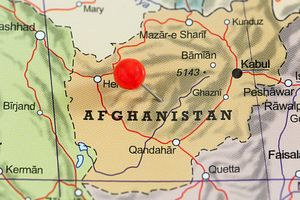On March 25, the president of Afghanistan, Ashraf Ghani assailed Pakistan in a blistering speech for allegedly providing sanctuaries to militants targeting his country. A week before Ghani’s speech, a suicide attack in Kabul killed at least 64 people, while injuring hundreds.
Ghani’s speech has come at a time when the Afghan peace process is in a very complicated situation. Apparently, the peace process led by Pakistan, Afghanistan, the United States, and China–the so-called Quadrilateral Coordination Group–has hit a dead end, with Ghani demanding an action against the leadership of the Afghan Taliban, which is believed to be based in Pakistan. He further said that his country didn’t expect Pakistan to bring the Taliban to peace talks. There are two major factors which could have dictated this bold policy decision for Ghani.
First, the deteriorating security situation in Afghanistan, exacerbated by the Taliban’s relentless bombing campaign, has weakened Ghani politically at home. Domestically, with growing pressure from opposition parties and even from some factions of his own government, Ghani’s position has become so precarious that he can no longer afford to wait for the peace talks, which have yielded no results. Clearly, Ghani’s policy of reaching out to Pakistan has not worked as Islamabad has been unable to put into effect its so-called and much talked about “influence” over the Afghan Taliban.
Second, there is growing evidence to suggest that Islamabad has yet to give up on its policy of making distinctions between different militant groups. A few months ago, Pakistani Foreign Affairs Advisor Sartaj Aziz openly admitted that Pakistan still enjoyed major influence over the Afghan Taliban because the latter’s leadership resides in Pakistan.
Reportedly, Pakistan’s ongoing military operation against militant groups based in the country’s tribal regions has been indiscriminate. However, evidence suggests that Pakistan continues to shelter and patronize different militant groups, particularly the Haqqani Network (HQN). Reportedly, the HQN was responsible for the bombing that rocked Kabul a week ago. Moreover, the group played a key role in resolving the leadership crisis among the Afghan Taliban, which had worsened after the death of Mullah Omar. One can argue that the Taliban’s recent military victories across Afghanistan are perhaps the result of this new found unity.
The United States recently released a statement saying that groups such as the HQN and the Afghan Taliban continue to operate from Pakistan. “We have consistently expressed our concerns at the highest level of the government of Pakistan about their continued tolerance for Afghan Taliban groups such as the Haqqani Network operating from Pakistani soil,” said the U.S. State Department.
Recently, the National Security Archive at George Washington University published a number of unclassified documents which claim that large part of the HQN’s funding comes from the Afghan Taliban leadership based in Pakistan. One cable notes that “A large majority of the Haqqani Network (HQN) funding comes from the Quetta, Pakistan-based Taliban leadership.”
While Kabul is mourning the deaths of those who died in the attack last week, Islamabad is hosting a delegation of the Afghan Taliban. Reportedly, the delegation is in Islamabad to discuss the release of a senior Taliban commander. The presence of the Afghan Taliban on Pakistan’s soil confirms that Islamabad has close ties with the group.
Pakistan’s continuous support for these groups has much to do with the Indian presence in Afghanistan. Islamabad is paranoid about New Delhi’s influence in Afghanistan, and, as long as this paranoia exists, its policy of supporting these groups is not likely to change.
Nevertheless, it doesn’t mean that Pakistan is not interested in peace or stability in Afghanistan. In the long run, Pakistan’s own stability and economic prosperity are tied in with peace in Afghanistan. Islamabad has pushed the Afghan Taliban and other groups for peace talks but this push has been in the form of requests rather than force. One can argue that Islamabad is not interested in pushing these groups to a level where they become alienated from Pakistan’s leaders.
Moreover, a weak and divided government in Kabul, coupled with a poorly trained and badly equipped military force, has further exacerbated the problem. For any peace process or military action to succeed against the battle-hardened Afghan Taliban, internal unity is essential.
Apparently, Ghani has reverted back to former Afghan President Hamid Karzai’s policy of blaming Pakistan for not doing enough to tackle cross border infiltration. This policy change could win him some friends in the Afghan Parliament, but it is not likely to bring down the spiraling Taliban insurgency. These unfortunate developments doesn’t just reflect one country’s loss, but a loss of security for the entire region.

































